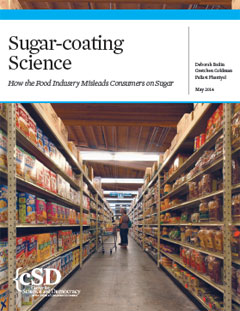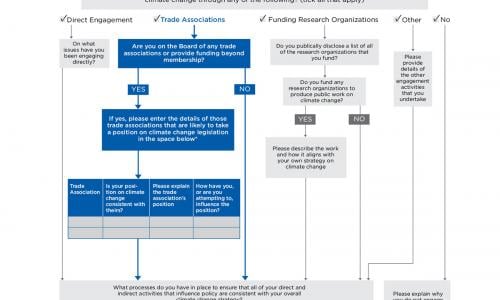We eat too much sugar, and it’s bad for our health.
A growing body of scientific evidence supports this proposition, and groups such as the World Health Organization, the American Heart Association, and the U.S. Department of Health and Human Services have confirmed it by recommending sugar intake limits well below typical consumption levels.
Yet despite the evidence that we need to eat less sugar, we continue to consume far too much of it—encouraged by the aggressive, and often deceptive, marketing strategies of the food and beverage industry.
Big advertising budgets
The top 10 food and beverage companies in the United States sell a majority of the sugary products that US residents consume—and they spend billions of dollars each year advertising these products.
Soda and other sweetened beverages top the list, with the top 10 companies spending over $1 billion on beverage advertising alone. Other major product categories with big advertising bankrolls include sugary cereals, baked goods, and snacks—as well as foods you might not expect to be high in sugar, such as bread, soup, yogurt, and salad dressing.
Deceptive marketing practices
There are several ways in which companies can mislead consumers about sugar content. They may:
- Take an established brand that's light in sugar and market new, sweeter versions of the brand—such as the cereal brands shown at right.
- Use words commonly associated with health or fitness to market sugary products—such as using the word "fruit" to market products that have very little fruit content and almost none of the nutritional benefits of whole fruit.
- Employ PR campaigns and front groups to promote pro-sugar messages. For instance, the PR firm of Berman and Company conducted a sophisticated campaign on behalf of the Corn Refiners Association, using the resonant messages that added sugar is "natural" and that how much sugar we eat is a matter of "consumer freedom" rather than public health.
Targeting vulnerable audiences
Sugar interests use specific tactics to zero in on demographic groups, taking advantage of psychological, social, or economic vulnerabilities.
Children are targets of nearly a quarter of the food industry's advertising budget. Research has shown that they particularly vulnerable to sugar advertising: they are more receptive to sweet tastes than adults, and young children, in particular, do not recognize "persuasive intent"—in short, they don't know when they are being marketed to. Efforts to limit advertising to children through the powers of the Federal Trade Commission and Federal Communications Commission gathered momentum in the 1970s, but fell victim to deregulation in the 1980s.
Women, minorities, and low-income populations are also targets of specifically tailored strategies. For example:
- Women are targeted through gender-based messages that exploit traditional family roles and tie sugary foods to self-worth.
- TV shows aimed at African American audiences feature a disproportionate amount of advertising for sugary products.
- Supermarkets advertising in low-income neighborhoods are more likely to feature coupons and other promotion of processed foods or sweetened beverages.
Fighting deception with science-based communication
Sugar interests have used behavioral and social science to hone these marketing strategies. To help people see through the deceptions and make healthy choices about sugar consumption, science communicators should present their messages in a way that connects with people's daily lives and engages their emotions. As the history of successful public service announcements (PSAs) shows, when this is done well it can have enormous impact on public opinion and behavior.
Recommendations
- Sugar interests should be held accountable by experts, investors, decision makers, the media, and the public for their current efforts to obscure the science on sugar and its detrimental health effects.
- Congress should restore the Federal Trade Commission and Federal Communications Commission to their full capacity to regulate marketing to children so that the agencies can regulate youth-targeted marketing.
- The Food and Drug Administration should implement a strong rule requiring the labeling of added sugar in nutrition labels as the agency announced they intend to do.
- Federal, state, and local health agencies should develop aggressive public information campaigns to emphasize the scientific evidence demonstrating sugar's health impacts and counter the misinformation from sugar interests.








